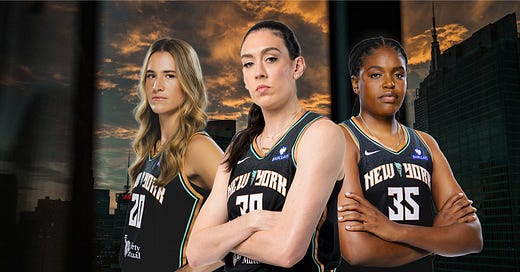The New York Liberty Became the First $450M Women’s Team
What It Means for the Business of Sport
The New York Liberty has officially become the world's most valuable women’s sports team.
Valued at $450 million following the sale of a minority stake, the Liberty didn’t just top the charts, they redefined them.
This figure didn’t come out of thin air. It’s the result of years of planning, investment, and strategic repositioning that turned a WNBA franchise into a culturally and commercially elite property.
More importantly, it serves as a blueprint for the future of women's sport as a serious business, not a ‘movement’, a premium investment category.
To understand how the Liberty got here, you have to go back to 2019. That’s when Joe Tsai, co-founder of Alibaba and owner of the Brooklyn Nets, bought the team. At the time, the Liberty were operating out of Westchester County Centre, hardly befitting of a New York franchise.
Fast-forward six years, and the transformation is complete. The Liberty now play at the Barclays Centre, share infrastructure with the NBA’s Nets, and boast a star-studded roster featuring Breanna Stewart, Sabrina Ionescu, and Jonquel Jones. They won the WNBA title in 2024, cementing their status on the court. But it’s off the court where the real business story begins.
The minority stake deal, first reported by Reuters and confirmed by ESPN, is more than a headline. It’s a signal to the wider market.
The valuation eclipses the likes of:
Angel City FC ($250M)
Chelsea FC Women ($265M, based on Alexis Ohanian’s recent 10% acquisition for £20M)
The Liberty's number is built on fundamentals:
890% increase in season ticket memberships
130% year-on-year rise in merchandise sales
Sell-out games. Elevated social engagement.
A media profile that rivals top-tier men's teams.
There’s also a new 75,000-square-foot training facility in the works, set to open in 2027, with two courts, strength and recovery zones, and wellness suites. It’s being funded in part by the recent equity injection, showing how this valuation ties directly into reinvestment and infrastructure, not vanity metrics.
Follow me for more sports and life updates: Instagram
A key force behind the Liberty’s cultural rise? Shana Stephenson, the team’s Chief Brand Officer.
Unlike many women’s teams that borrow tone from their male counterparts, the Liberty built a brand of their own: stylish, bold, and unapologetically New York. They leaned into fashion week. They courted Gen Z. They crafted player-first storytelling. And they executed campaigns that brands could latch onto, not just support.
They didn’t ask for attention. They earned it. And that shift, from inclusion to influence, is a playbook more teams are now copying.
It’s tempting to look at this number and assume we’re in a hype cycle. But the truth is, the Liberty have been executing a tier-one business plan in plain sight.
They’ve:
Created cultural capital, not just sporting wins
Aligned with relevant movements, gender equity, athlete empowerment, city pride
Delivered ROI for partners through unique inventory and smart integration
Owned their infrastructure instead of outsourcing or borrowing from men’s teams
If a women’s team follows the same fundamentals that make men's teams valuable, audience, brand, location, ambition, they’re no longer punching above their weight. They’re just competing properly.
Earlier this month, Alexis Ohanian bought a 10% stake in Chelsea FC Women for £20M. That’s a £200M ($265M) valuation, substantial, and a major vote of confidence in European women’s football. But the Liberty’s $450M mark almost doubles that.
That contrast should make people pause.
It’s not about the number of fans. It’s about the intensity of engagement, the structure of the deal, and the vision of the owners.
Chelsea Women are one of the best teams in the world. But until 2024, when they the club became its own business, they were still tied to Chelsea FC, the globally recognised men’s team. Of course, this meant the club’s priorities were more focused on the men, because that was its major revenue generator.
The Liberty? They’ve stood alone. That makes the upside and the identity cleaner, clearer, and more investable.
For years, the message has been the same: “Invest in women’s sport, it’s undervalued.”
That may have been true. But what the Liberty have shown is that value doesn’t just materialise. It’s constructed through smart ownership, elite talent, cultural integration, and infrastructure.
It takes intention.
You can’t just slap equality messaging on a banner and hope someone writes a cheque. You have to build something people want to be part of.
That’s what the Liberty have done. And now they’re in a league of their own. For now!
Thanks for reading, David Skilling.
Follow me on LinkedIn | X | Instagram
If you hit the like button, you’ll be doing me a huge favour, and if your business needs sports writing, wants to discuss advertising, or you have PR stories to pitch, feel free to get in contact.
If you know someone who will enjoy this article, please share it with them.




